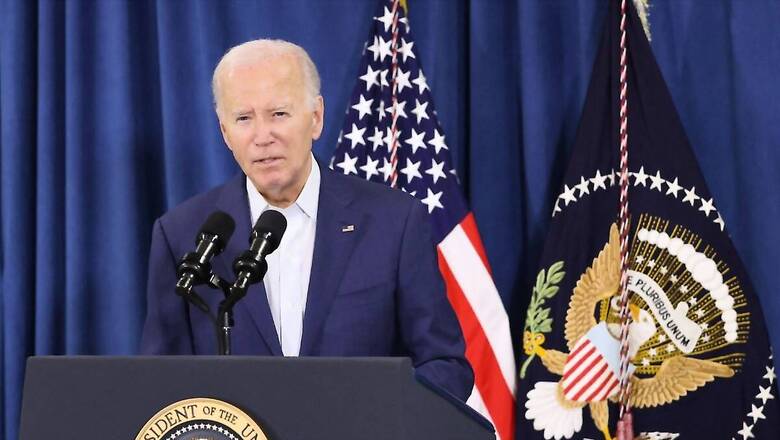
views
The assassination attempt on Donald Trump on July 13 has seemingly turned the whole campaign into a mere formality, with CNN projecting 283 seats for Trump in its latest prediction, easily crossing the magic mark of 270.
Moreover, Joe Biden announced that he has contracted Covid-19 and will be isolating until recovery, thereby cancelling his future events and campaign.
CNN also reported that Former House Speaker Nancy Pelosi has reportedly informed the US President that he cannot defeat Trump and continuing his re-election bid could also negatively impact Democrat’s chances of winning the White House, a suggestion to which Biden reportedly resisted.
Former US President Barack Obama too is reported to have privately expressed concerns about Biden’s prospects in the 2024 polls.
Joe Biden himself is reportedly interested in Kamala Harris’s prospects of leading the Dems, with his stance changing from “Kamala can’t win” to “Can Kamala win?”
As pressure mounts on Biden to drop out of the race, we look back into history to check if there are other US Presidents who didn’t seek a second term.
JAMES K POLK (1848): Polk chose not to seek re-election after serving one term. He had promised not to run for a second term and claimed to have achieved his major policy goals. He was in poor health near the end of his term and died of cholera shortly after leaving office in 1849.
RUTHERFORD B HAYES (1880): Hayes also chose not to run for a second term, following through on his earlier promises to serve only one term as president. Hayes declined re-nomination by the Republican Party in 1880, choosing to serve only one term as president. After retiring, he dedicated himself to humanitarian efforts, particularly focusing on prison reform and improving educational opportunities for Southern black youth.
CALVIN COOLIDGE (1928): Coolidge succeeded to the presidency when President Harding died in office in 1923. He was elected in 1924 but declined to run for a second elected term in 1928. In 1928, announcing, “I do not choose to run,” Coolidge turned his back on what surely would have been another election victory and instead retired to Northampton.
HARRY TRUMAN (1952): Truman ascended to the presidency when Franklin Roosevelt died in office in 1945. He was elected in 1948 in an upset victory over Thomas Dewey. The 22nd Amendment, ratified in 1951, would have allowed Truman to seek a third (second elected) term, but he declined to run.
LYNDON B JOHNSON (1968): Johnson became president after the assassination of President Kennedy in 1963. His first term lasted only 14 months, and he was elected for a second term in a landslide victory in 1964. Under the 22nd Amendment, he was eligible for a second elected term, but he declined to seek re-election in 1968, famously declaring on television, “I shall not seek, and I will not accept, the nomination of my party for another term as your President.”













Comments
0 comment